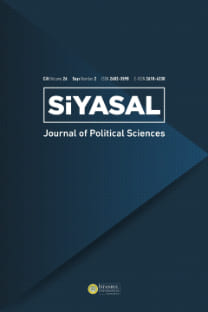Rusya Türkiye İlişkileri ve Hükümet Dışı Aktörler (HDA)
Türkiye ve Rusya arasındaki ilişkiler geleneksel olarak daha çok devletten devlete ilişkiler olarak ele alınmıştır. Bununla birlikte giderek artan ticaret hacmi ve insan hareketlerinin etkisiyle Hükümet Dışı Aktörlerin (HDA) de bu ilişkide etkili olmaya başladığı söylenebilir. İşadamı örgütleri, karma evlilikler sonucu ortaya çıkan sosyal gruplar, etnik gruplar, Rus Ortodoks Kilisesi, Müslümanları temsil eden kurumlar, bilim insanları bu yazıda ele alınan aktörlerdir. Yazı bu aktörlerin hangi yöntemleri kullandıklarını, Rusya-Türkiye ilişkilerine olan etkilerinin boyutlarını ve son olarak sınırlarını ortaya koymaktadır.
Anahtar Kelimeler:
Türk Dış Politikası, Rusyanın Türkiye Politikası, Hükümet Dışı Aktörler, İşadamı Örgütleri, Karma Evlilikler, Etnik Gruplar, Ortodox Kilisesi
RUSSIA-TURKEY RELATIONS AND NON-GOVERNMENTAL ACTORS (NGOS)
Turkey-Russia relations are generally considered and studied as state to state relations. However, together with the increasing volume of trade and human mobility, it could be claimed that Non-Governmental Actor’s also started to have a role in this relationship. Businessman associations, social groups that exist out of mixed marriages, various ethnic groups, Russian Orthodox Church, religious authorities that represent Russian Muslims and scientists are the actors that are focused within the scope of this article. The methods they use, potentials and limits of their influence are tried to be analyzed in this article.
Keywords:
Turkish Foreign Policy, Russia’s Turkey Policies, NGOs, Businessmen Associations, Mixed Marriages, Ethnic Groups, Orthodox Church,
___
Atasoy, Emin (2008). Rusya Federasyonu Sınırları İçinde Yer Alan Özerk Cumhuriyetlerin Etnocoğrafya Işığında Değerlendirilmesi. Turkish Studies (International Periodical For the Languages, Literature and History of Turkish or Turkic), 3(7), 83-124.Borer, Douglas A. ve Jason J Morrissette (2006). Russian Authoritarian Pluralism: a Local and Global Trend? Cambridge Review of International Affairs, 19(4), 571-588.
Crews, Robert D. (2014). Moscow and the Mosque. Co-opting Muslims in Putin’s Rusia. Foreign Affairs, 93(2), 125-134.
Danreuter, Roland (2006). Islamic radicalization in Russia: an assessment. International Affairs, 86(1), 109-126.
Grigoryan, Marianna (2012). Armenia: Labor Migration Program Causing Yerevan- Moscow Friction. http://www.eurasianet.org/node/66092, 23 Ekim, Erişim:4.1.2014.
http://www.rtib.com/ erişim 9.1.2014.
http://www.rutid.ru/ erişim 9.1.2014. Karagiannis, Emanuel (2011). Energy and Security in the Caucasus. Routledge Curzon, Oxon and New York.
Karpat, Kemal (2004). Studies on Turkish Politics and Society: Selected Articles and Essays. Brill, Leiden.
Kılıçbeyli, Elif Hatun (2003). Yeni Dönem Türk-Rus İlişkileri (1994-2000) Ticaret ve Yatırım Trendleri. (Der.) Gülten Kazgan ve Natalya Ulçenko, Dünden Bugüne Türkiye ve Rusya: Politik, Ekonomik ve Kültürel İlişkiler, içinde. İstanbul Bilgi Üniversitesi Yayınları, İstanbul.
Levitsky, Steven ve Lucan A.Way (2002). Elections without Democracy- Rise of Competitive Authoritarianism. Journal of Democracy, 13(2), 51-65.
Özsağlam, Muhittin T. (2006) “Geçmişten Günümüze Avrasyacılık” Kıbrıs Yazıları, No 3, ss.114-122.
Özsağlam, Muhittin T. (2013). State Centric Russian Energy Policy and Reaproachment in Russia-Turkey Relations. YDÜ Sosyal Bilimler Dergisi, 6(2) 158-177.
Rus Halk Meclisi (2012). On the state of civil society in the Russian Federation for 2012. http://www.oprf.ru/files/doklad_grazdanskoe_obshestvo.pdf, erişim 30.12.2013, s.113.
Selvi, Abdülkadir (2013). Şangay’a alın AB’den kurtarın. Yeni Şafak, 22 Kasım. http:// yenisafak.com.tr/politika-haber/sangaya-alin-abden-kurtarin-23.11.2013-585183, erişim 9.1.2014.
Sotnichenko, Alexander (2009). Islam-Orthodox Church Relations and the the State in Post-Communist Russia. Politics and Religion. 3(2), 263-275.
Yinanç, Barçın (2013) “Armenian Diaspora: Focus on Russia rather than Turkey”, http:// www.hurriyetdailynews.com, 17 Aralık.
http://dumrt.ru/en/news/news_983.html.
- ISSN: 1303-1260
- Yayın Aralığı: Yılda 2 Sayı
- Yayıncı: İstanbul Üniversitesi
